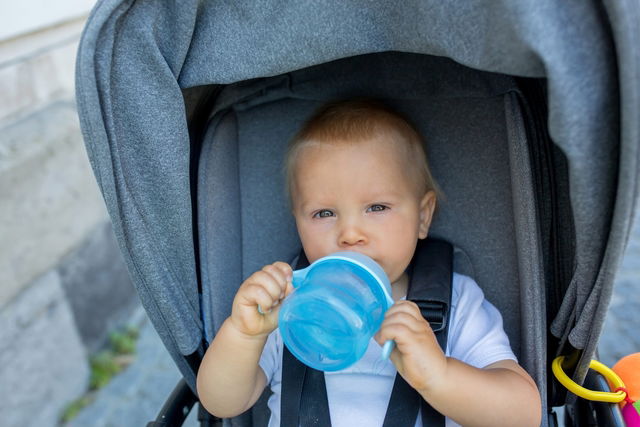Signs of dehydration in babies can emerge when there is too little water in the body for it to function properly. It can lead to sunken eyes, decreased urination, excessive thirst, dry skin and mouth, crying without tears and sinking of the baby's fontanelle.
Dehydration in babies usually occurs due to episodes of diarrhea, vomiting or excessive heat and fever, and can also be related to viral or bacterial infections.
Babies and children can become dehydrated much more easily than teenagers and adults, as they tend to lose body fluids more quickly. Therefore, children and babies who present with signs of dehydration should be assessed by a pediatrician or general practitioner so that the diagnosis can be made and the most appropriate treatment can be initiated.

Main symptoms
The main signs of dehydration in babies and children are:
- Sinking of the baby's fontanelles
- Deep eyes
- Decreased urinary frequency
- Dry skin, mouth or tongue
- Chapped lips
- Crying without tears
- Diapers that have been dry for more than 6 hours or have yellow, strong-smelling urine
- Intense thirst
- Unusual behavior, irritability or apathy
- Drowsiness, excessive tiredness or altered levels of consciousness
If any of these signs of dehydration are present, the pediatrician may request blood and urine tests to confirm dehydration.
Treatment options
The treatment of dehydration in children can be done at home. Hydration should be restored with breast milk, water, coconut water, soup, foods rich in water or juices to prevent the situation from getting worse. Furthermore, oral electrolytes can also taken. They can purchased at pharmacies and taken throughout the day.
If dehydration is caused by vomiting or diarrhea, the doctor may also recommend taking some antiemetics, anti-diarrhea medications and probiotics, if necessary. In more serious cases, the pediatrician may request that the child be hospitalized so that fluid can be administered IV.
Treating dehydration at home
To reduce signs of dehydration in babies and children, you can:
- Dehydration caused by diarrhea should be treated with electrolytes as indicated by the pediatrician. If the child has diarrhea but is not dehydrated, you can prevent dehydration by taking a serving of electrolyte solutions for each bowel movement. Doses should be taken as prescribed or indicated on the solution packaging.
- When vomiting occurs, rehydration should be started with 1 teaspoon (5 mL) of serum every 10 minutes, in the case of babies, and in older children, 5 to 10 mL every 2 to 5 minutes. Every 15 minutes, the amount of serum offered should be slightly increased so that the child can stay hydrated.
- It is recommended to offer the baby and child water, coconut water, breast milk or infant formula to satisfy their thirst.
Feeding should begin 4 hours after oral rehydration, with easy-to-digest foods being recommended in order to improve intestinal transit.
In the case of babies who feed exclusively on breast milk, it is important that this type of feeding is continued even when the baby shows signs of dehydration.
When to take your child to the pediatrician
The child should be taken to the pediatrician or emergency room if the following signs and symptoms are present:
- Excessive tiredness, with difficulty waking up
- Severe abdominal pain
- Vomiting for more than 24 hours
- Urine leak for more than 6 hours
- Bloody stools
- High fever
These symptoms may be indicative of severe dehydration, and the doctor may recommend that the child remains in the hospital so that serum can be administered directly into the vein, in addition to antiemetic and antidiarrheal medication, if necessary.
